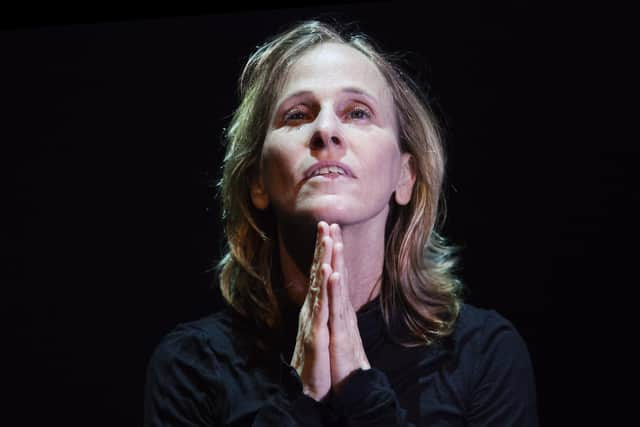Deborah Colker on helping Scottish Opera embrace the spirit of flamenco for Ainadamar
Spanish people: they talk and sing with their hands,” insists Deborah Colker, currently in Glasgow to direct the UK stage premiere of Argentine composer Osvaldo Golijov’s Grammy Award-winning opera Ainadamar (Fountain of Tears) for Scottish Opera.
Colker is Brazilian, and her words are a torrent of gravelly passion, her hyperactive hand-gesturing like an emphatic simultaneous translation. An opera that celebrates the life and death of murdered Spanish poet and playwright Federico García Lorca through the eyes of his actress friend Margarita Xirgu, and which features within its cast a genuine flamenco singer (Alfredo Tejada) and the intense physicality of the associated dance style, would seem to be right up her street.
Advertisement
Hide AdAdvertisement
Hide AdExcept that this is the 62-year-old award-winning writer, theatre and dance director’s first venture into opera. “I came from a musical world and my father, who was a conductor and violinist, brought me to see opera from an early age,” she says. “I studied piano, but I also liked sport, so I moved to dance.”


Among her 30-plus theatre productions she boasts a Laurence Olivier Award, has choreographed for the likes of Cirque du Soleil and the 2016 Rio Olympics opening ceremony, and recently directed a major stage musical in Brazil. So opera seemed an obvious next step. “It’s totally different to be working now with lyric singers, but they have this density, so much expressivity.”
Movement is key in capturing the spirit of this opera, Colker explains. “It’s not a Lorca biography; it’s something inside the head of Margarita, shifting between the present, past, even the future through her own student Nuria, who is not real. She is all the students that Margarita was teaching, the girls who represent the new generation. This is really important, to keep Lorca and his works alive. Ainadamar is about life and death, about sight and silence; it’s about flamenco and the sound of the water.”
It’s also about achieving a visual spectacle of unified movement, a stage ensemble capturing its sensuousness and vitality as a cohesive, but multi-faceted, organism. “Ainadamar is a unique duel between traditional flamenco and classical opera,” Colker believes. “Everybody needs to sing, to dance, to act. This is not common inside the opera world, to ask everybody to do everything. I need to take care with the singers’ breathing, show them how they can use their bodies in different ways. If I didn’t insist on that here, I wouldn’t be doing my job.”
She isn't alone in treading unfamiliar ground. Golijov’s music – its guttural Andalusian-inspired earthiness driven by sensual melodic contours, frenzied hypnotic rhythms and ecstatic colours – is also new territory for Scottish Opera’s musical director Stuart Stratford. “Stuart keeps saying to me: ‘this is so exciting, so inspiring, so totally different from what we’ve ever done before.’”
And it has to look the part. Enter stage designer Jon Bausor. “I didn’t know him before, but he knew my work, and that I love to work with set, to find a transformative relationship between dramaturgy and place,” Colker explains. She was insistent, for instance, that the set incorporated authentic “tablaos”, the wooden-floored venues where Spanish flamenco is traditionally performed. “So we have these inside the cafe, at the bar, for our dancers, the flamenco singer and the guitars. It’s all written into the score; Golijov doesn’t give you a choice.”
Finally, this will be a very different experience for traditional Scottish opera goers. “I hope they will see this as a powerful adventure,” says Colker. “I want them to be invited to be inside this passionate world, to fight against fascism, to cry with Margarita, with her suffering, with Lorca. For him the most important thing was love. I want to make audiences feel this, to go out wanting to dance, to sing. That is my focus.”
Scottish Opera’s Ainadamar is at the Theatre Royal, Glasgow, from 29 October until 5 November, then at the Festival Theatre, Edinburgh, from 8-12 November, see www.scottishopera.org.uk